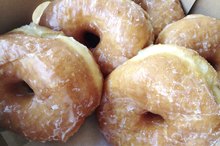Breakfast for a Yeast-Free Diet
Candida albicans is a yeast that naturally occurs in the body and flourishes in warm, moist areas. The body’s healthy bacteria generally keep yeast levels in check, but when bacteria levels are disturbed -- for example, when you take antibiotics -- yeast populations may grow to undesirable levels. A yeast-free diet may be one way to help control the overgrowth of Candida albicans yeast 3.
Avoid Yeast-Containing Foods
A yeast-free diet calls for the elimination of all foods made from baker’s yeast. These commonly include:
- bagels
- breads
- rolls
- croissants
- pastries
- donuts
Include Protein at Breakfast
Does Activia Help With a Yeast Infection?
Learn More
Eggs are a yeast-free and convenient option for breakfast. Try an omelet with spinach and tomatoes or a poached egg with Canadian bacon served over sauteed asparagus and red peppers. Probiotics like Lactobacillus acidophilus are healthy bacteria that may help to prevent yeast infections 4. Breakfast food sources of probiotics include unsweetened yogurts that contain live and active cultures, and kefir, a fermented milk product.
- Eggs are a yeast-free and convenient option for breakfast.
- Breakfast food sources of probiotics include unsweetened yogurts that contain live and active cultures, and kefir, a fermented milk product.
Limit Sugars
The yeast-free diet recommendations from The Center for Proactive Medicine advise avoiding all concentrated sweets like sugar, honey, maple syrup, anything containing high fructose corn syrup and fruit juices. The center also recommends limiting carbs to 15 grams per meal. Many processed breakfast cereals contain added sugar and are high in carbs. Instead, choose a 1/4-cup serving of plain, whole grains like oats, quinoa or barley. Top it with a spoonful of yogurt or kefir and a sprinkle of nuts as a breakfast option. While fruit juices should be avoided, a small serving of fruit, except melon or grapes, may be included at breakfast. Fruit is high in carbs, so eat it with protein like eggs or meat, not grains, which provide additional carbs.
- The yeast-free diet recommendations from The Center for Proactive Medicine advise avoiding all concentrated sweets like sugar, honey, maple syrup, anything containing high fructose corn syrup and fruit juices.
- While fruit juices should be avoided, a small serving of fruit, except melon or grapes, may be included at breakfast.
Coffee Is OK
Diet for Oral Thrush
Learn More
Soy milk or other nut milks are preferred over cow’s milk, which, according to The Center for Proactive Medicine, may contain or support the growth of mold.
Related Articles
References
Writer Bio
Anne Danahy is a Boston-based RD/nutritionist who counsels individuals and groups, and writes about healthy eating for wellness and disease management. She holds a Bachelor of Arts from the University of Notre Dame, and a Master of Science in food and nutrition from Framingham State University in Massachusetts.









